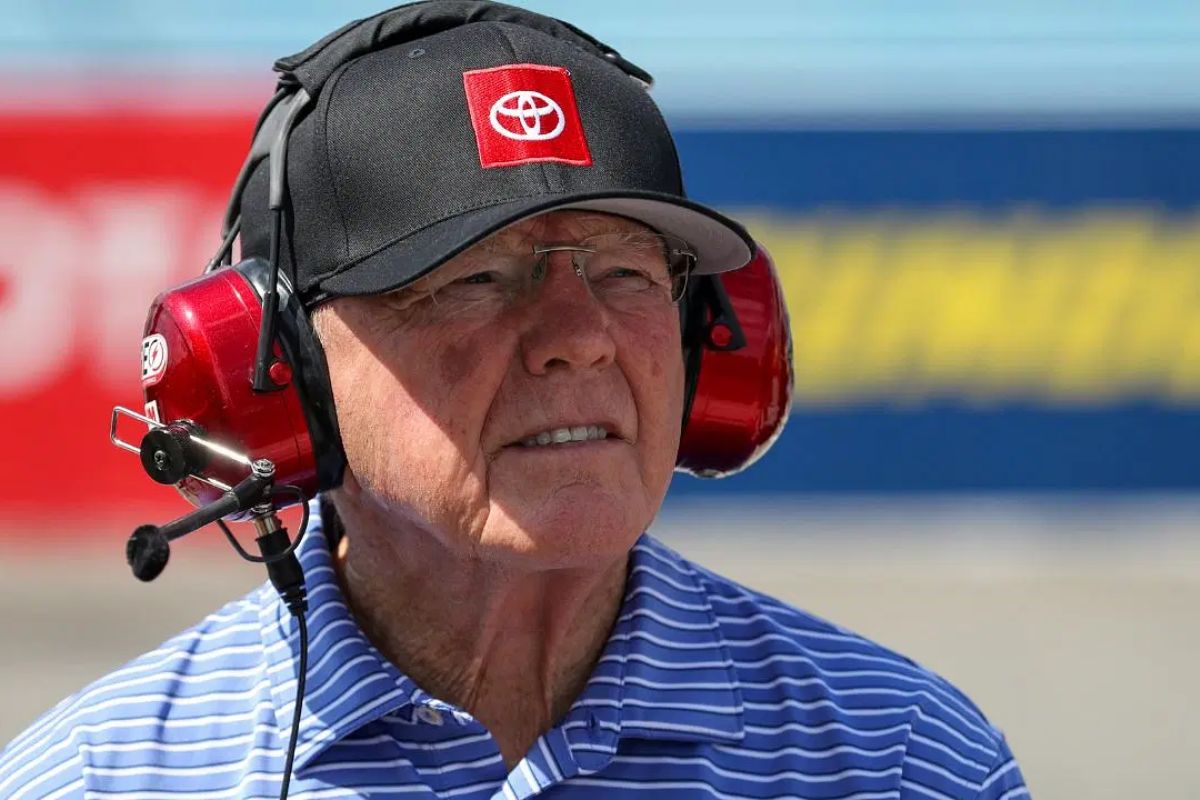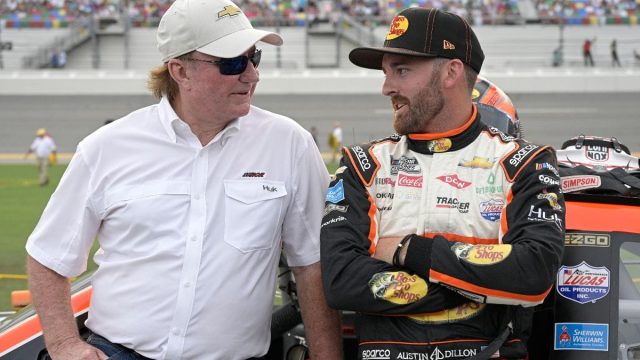Brian France Faces Fan Fury: Brian France’s leadership in NASCAR remains polarizing, especially amid accusations of nepotism directed at Austin Dillon, Richard Childress‘ grandson. France’s tenure brought about notable changes, such as the introduction of the Chase for the Cup, but also stirred fan discontent due to perceived favoritism within well-known racing families. Critics argue that such family legacies undermine fair competition, while supporters emphasize the deep-rooted passion and talent emerging from these dynasties. Despite the mixed reactions, Dillon’s performance and commitment continue to spark robust debates on merit and privilege within the sport. Understanding these dynamics offers deeper insight into NASCAR’s evolving landscape.
Key Takeaways
- Brian France’s tenure introduced controversial changes that divided fan opinions and led to mixed loyalty.
- Austin Dillon, Richard Childress’ grandson, faces nepotism accusations despite fans defending his merit and dedication.
- The debate on nepotism in NASCAR questions fairness, talent evaluation, and competitive balance within the sport.
- Fans and critics clash over whether familial involvement enriches NASCAR’s authenticity or undermines meritocracy.
- France’s leadership style often conflicted with NASCAR’s traditions, intensifying scrutiny over family legacies in the sport.
Nepotism in Sports
Nepotism in sports, an issue that challenges the meritocratic ideals of professional athletics, often sparks heated debates about the influence of familial connections on the careers of athletes. This controversy greatly hinges on the perpetual debate of talent vs connection, scrutinizing whether athletes succeed based on merit or the advantage of their family name.
The entry of Bronny James into the NBA is a recent example that highlights this duality, reigniting discussions on the fairness and integrity of professional sports.
The principle of fair opportunity is fundamental in sports, where the assumption is that every athlete competes on an equal playing field. However, family influence can skew this principle, offering certain athletes preferential treatment and access to resources that may not be available to their peers. This raises critical questions about the authenticity of skill evaluation processes within professional leagues.
Are athletes like Bronny James judged purely on their performance standards, or do their familial ties unduly sway decisions?
Family influence can provide burgeoning athletes with exceptional guidance, training, and exposure, yet it must be carefully balanced against the need for objective skill evaluation. The true measure of an athlete’s potential should ideally be their demonstrable talent and consistent performance, rather than their lineage.

Nepotism in NASCAR: A Legacy of Families
The intricate tapestry of NASCAR’s history is inextricably woven with the legacies of prominent racing families, raising ongoing debates about privilege versus merit within the sport. The Pettys, Earnhardts, and Gibbs families, among others, presented this enduring tradition, where family dynamics and racing heritage converge, often overshadowing individual skills on the track.
The phenomenon of family legacies in NASCAR sparks a multifold succession debate. On one hand, the familial connection to the sport brings a wealth of knowledge, experience, and resources, potentially smoothing the career paths of new drivers. However, this privilege often incites inspection over whether these individuals earn their positions through talent or lineage. Critics argue that such entrenched family dynamics could stifle diversity and limit opportunities for similarly or more talented outsiders, perpetuating a cycle of nepotism.
Talent evaluation within these prominent families becomes particularly complex. The challenge lies in discerning whether a driver’s success stems from inherent skill or the advantages conferred by their racing heritage. For instance, Richard Childress’ grandson, who has recently dodged the ‘nepotism’ tag, must continually prove his merit amidst the legacy of his family name.
While these families undeniably contribute to the rich cultural and competitive fabric of NASCAR, their dominance also poses critical questions about fairness and the true meritocracy of the sport.
Brian France: A Controversial Legacy
As the grandson of NASCAR’s founder, Bill France Sr., Brian France’s tenure as CEO was characterized by both groundbreaking innovations and polarizing controversies. His controversial leadership began in 2003, when he introduced the Chase for the Cup, a playoff system designed to enhance competition. While this move initially increased TV ratings, it also disrupted NASCAR’s traditional point-based system, alienating many long-time fans. This dichotomy in responses highlights the intricate interplay between family ties and fan loyalty in NASCAR’s corporate culture.
France’s leadership style often clashed with the industry’s legacy. His focus on expanding NASCAR’s reach included significant changes like diversifying race locations and attracting a broader audience. However, these initiatives sometimes came at the cost of the sport’s traditional fan base, leading to declining race attendance and TV ratings over time.
| Positive Changes | Controversies | Long-term Impact |
|---|---|---|
| Chase for the Cup | Alienation of Traditionalists | Declining Attendance |
| Increased TV Viewership | Disruption of Point System | Mixed Fan Loyalty |
| Diversification of Races | Dropping Ratings | Legacy of Innovation |
Brian France’s tenure is a study in the balance between innovation and tradition. While his reforms modernized NASCAR, they also sparked debates about the preservation of its core values. This tension between evolving the sport and maintaining its foundational principles has left a lasting, albeit mixed, legacy. The complexity of his leadership reveals the challenges inherent in navigating family ties within a corporate culture, where decisions can profoundly impact fan loyalty and the industry’s future.
Fan Reactions: Defending Austin Dillon
Many fans, while acknowledging the complexities of nepotism in NASCAR, have actively defended Austin Dillon’s merit and accomplishments in the sport. This defense stems from a perspective that transcends mere family ties, emphasizing Dillon’s tangible achievements and consistent performance. For these fans, performance matters above all else, and Dillon’s track record includes significant milestones such as winning championships in both the Truck and Xfinity series, along with multiple Cup Series victories.
“Oh yeah, that fucking idiot ruined so much of the legitimacy of NASCAR.”
“As much as people are gonna wanna say guys like Austin Dillon and others idk how anybody can top this [ Brian France] one.”
-(fans)

Fan loyalty has played a vital role in shaping the discourse around Dillon’s career. His supporters argue that his driving skills have been honed through rigorous competition and that his results are a reflection of his capabilities. From the fan perspective, Dillon’s achievements cannot be dismissed as mere byproducts of his lineage. Instead, they highlight his commitment and ability to compete at a high level. This is particularly notable given the high expectations and scrutiny that come with driving the iconic #3 car, once famously piloted by Dale Earnhardt Sr.
“I don’t think AD is really near the top at least not til lately. He’s got a truck and Xfinity championship which is plenty to get his cup ride to originally and 4 cup wins and multiple playoff appearances. He isn’t good by any means but people have been kept around for less than.”-(fans)
Critics may point to the inherent advantages provided by Dillon’s family ties, but his defenders counter that such advantages do not guarantee success in a sport as demanding as NASCAR. They emphasize that Dillon has faced and overcome the challenges associated with his heritage, proving himself through his racing skills. Therefore, while acknowledging the backdrop of nepotism, these fans focus on Dillon’s individual accomplishments and the skill set he brings to the track.
Perspectives and Impact
Debates surrounding nepotism in NASCAR reveal dynamics between legacy and meritocracy within the sport. The controversy surrounding Richard Childress’ grandson, Austin Dillon, epitomizes this tension. Critics argue that family connections can undermine fairness and competitive balance, while supporters contend that these connections preserve the sport’s rich heritage and continuity.
Analyzing the impact of nepotism on NASCAR requires examining different perspectives. From a meritocracy viewpoint, prioritizing talent over lineage is vital to maintain fairness and competitive balance. However, the sport’s deeply embedded family ties often mean that legacy cannot be entirely separated from merit.
- Legacy vs meritocracy: The balance between honoring heritage and ensuring that the most talented individuals rise to the top is a persistent challenge.
- Fairness concerns: Critics assert that nepotism can create an uneven playing field, where family connections overshadow genuine skill and hard work.
- Future direction: NASCAR must navigate these tensions carefully to sustain its growth and make sure that its policies reflect both tradition and modern standards of fairness.
Supporters of familial involvement highlight the passion and dedication that often come with family connections. They argue that the intimate knowledge passed down through generations can enrich the sport’s depth and authenticity. Conversely, detractors emphasize the importance of transparency and equal opportunities, advocating for a system that prioritizes merit to improve competitive balance.
The ongoing dialogue around nepotism in NASCAR is shaping its future direction. As NASCAR evolves, it must craft policies that respect its storied legacy while fostering a culture where meritocracy thrives.

News in Brief : Brian France Faces Fan Fury
The controversy surrounding Brian France and Austin Dillon highlights the intricate interplay of nepotism within NASCAR’s familial legacies.
The fan reactions reveal a divided community, with some defending Dillon’s merits while others criticize perceived favoritism.
This situation emphasizes the broader implications of nepotism in sports, necessitating a detailed understanding of meritocracy and legacy.
Analyzing these dynamics provides critical insights into the ethical and cultural dimensions that shape professional sports environments.
ALSO READ: Austin Dillon’s Take on Sonoma Early Exit : “It’s Hard”
